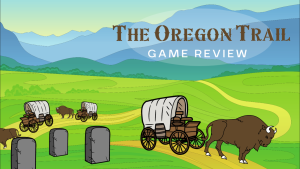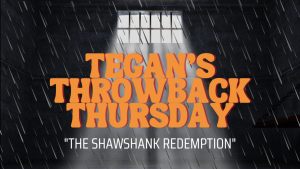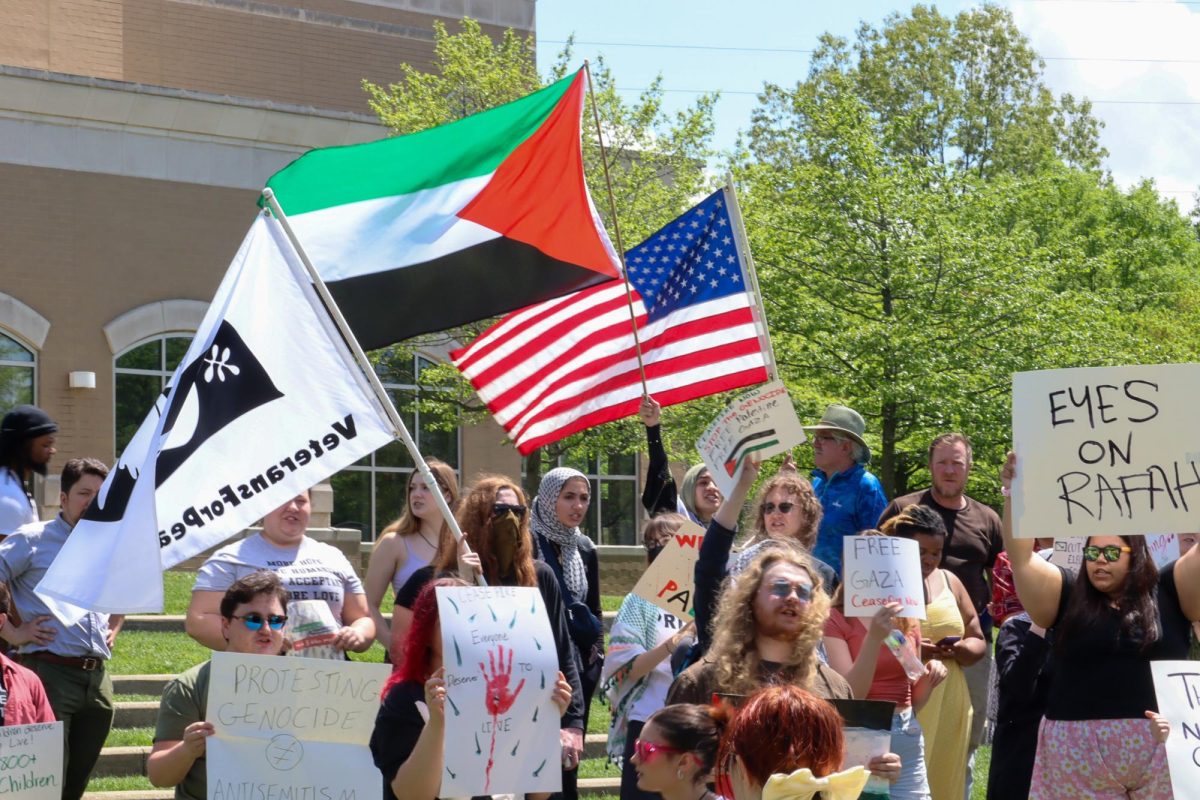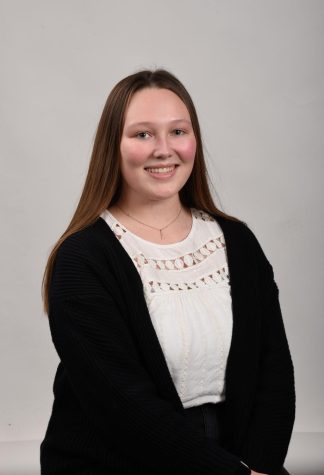Students, faculty and community members gathered to protest in support of Palestine Tuesday from 1-3:40 p.m. outside the David L. Rice Library.
A post was made to the USI 2025 private story on Snapchat Sunday announcing the protest.
Madalyn Cottrell, junior theatre major, said the protest started as a “random idea” through connections with a student at Indiana University Bloomington. Cottrell said IU had previously organized a social justice group called Students of Color in Evansville, and the student at IU who created this organization helped provide information for the planning of USI’s protest.
Cottrell said the protest was also created to support a Palestinian student. She said she wanted to show him support and that there are people on campus who also support Gaza.
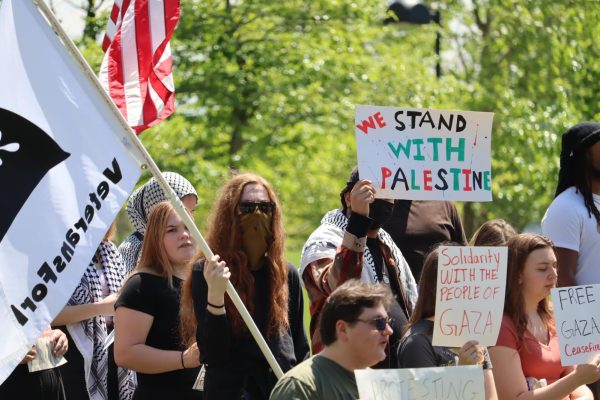
She said she wants other students on campus to know the protest was “not a pro-terrorism protest.”
“I feel like that’s a really easy hole to fall into if you don’t have a lot of education about what’s going on in the Middle East,” she said. “Ultimately, the biggest thing I want people to take away is that we want ceasefire. We want peace in Gaza. We want the dying to stop, we want the violence to stop, and we want the violence to other students to stop. I’m really upset about what’s going on at IU.”
IU’s campus has undergone several protests involving the arrests of students for participation.
Cottrell said she has a close friend who attends IU.
“It’s starting to affect people who are stepping up and saying something, and I just want it all to stop,” Cottrell said. “It’s not a moment, it’s the movement, and everything matters.”
Anden West, freshman exercise science major, said he also has friends who attend IU and has seen videos of protests online.
It’s freedom of speech. As long as there’s no violence, no antisemitic, no anti-muslim rhetoric, then it’s fine.”
— Victor Henderson, junior history major
He said students have “every right” to protest, as long as they are not breaking any property laws.
“I think as long as you keep this peaceful and not have people punch each other, then we’ll be fine,” said Victor Henderson, junior history major.
Henderson said he has been reading about the protests at Columbia University, and that is why he attended the USI protest.

“I just wanted to see if anything happened to that extent,” Henderson said. He said USI’s protest was mostly peaceful and not as bad as he thought it would be.
“It hasn’t been as bad as some of the schools I’ve seen,” he said.
Rosalie Moffett, assistant professor of English, attended the protest to show support.
“I felt that it was a good act of solidarity to be there as a faculty member and show my support for both the students that we have here at USI and also for students around the county,” Moffett said.
Moffett said she has seen gruesome and violent videos of brave students across the country trying to make their voices heard.
She said students standing up for what they believe in is an admirable act.
“There is ample evidence that not only is there a genocidal intent, but there’s active and imminent famine,” Moffett said. “There’s the deaths of thousands upon thousands of innocent people, and I think if you’re opposed to that kind of indiscriminate killing, then calling for a ceasefire is, again, just a role within a principled stance.”
Moffett said many people are experiencing the ongoing events in Gaza through on-the-ground livestreams and photographs on social media.
She said it is hard to see the logic in the argument that students should not be participating in protests because the history of protests in America is a rich tradition showcasing values and how occupying private property can be a way to bring change.
“If you think back to the sit-ins at diners for civil rights, that’s a direct echo,” Moffett said.
Ahmad Abushammalh, senior computer science major, is from Gaza, Palestine. He said he did not organize the protest, but other students on campus did.
“Students, people from the city, they are here to share their opinion and disagreements with the way the government does deal with the catastrophes unfolding,” he said.
Just as we have the right to voice our opinions, even if I don’t agree with someone else’s stance on something, I also understand that they have a right to advocate for what they believe in.”
— Madalyn Cottrell, junior theatre major
Abushammalh said seeing the protest supported him emotionally after seeing his family in Gaza “suffer for over 200 days.”
“It feels heartwarming to be covered with the community’s love and the message that all humans are equal,” Abushammalh said.
He said it also supports him to see students initiating the event.
“Knowing the history of the United States and sitting here, knowing the history of civil rights movements, and all that was started by students,” Abushammalh said.
Abushammalh said students who disagree with the protest in support of Palestine have the “full right” to their opinions.
But what I don’t want to happen is hate to be charged, is racism to be justified, and for the genocide to be justified because, at the end of the day, I can only hope that everybody wants the same thing, regardless of where you stand on the spectrum, we just want peace, and we want our government, local, and on a nationwide scale, to listen to us.”
— Madalyn Cottrell, junior theatre major
“I mean, this is not a totalitarian country, and indeed, it’s a civilian right,” he said. “However, opposing, is it referring to opposing it by having an opposing opinion, or is it attempting to stop any sort of activism by students? That should be the question.”
Other students also said others have the right to their opinions.
“Just as we have the right to voice our opinions, even if I don’t agree with someone else’s stance on something, I also understand that they have a right to advocate for what they believe in,” Cottrell said. “That is a basic American foundation. I support the right to free speech. But what I don’t want to happen is hate to be charged, is racism to be justified, and for the genocide to be justified because, at the end of the day, I can only hope that everybody wants the same thing, regardless of where you stand on the spectrum, we just want peace, and we want our government, local, and on a nationwide scale, to listen to us.”
Henderson said he thought the protest was fair and equally represented, seeing people representing Palestine and Israel.
God bless America, and God save Israel.”
— Victor Henderson, junior history major
“It’s freedom of speech,” he said. “As long as there’s no violence, no antisemitic, no anti-muslim rhetoric, then it’s fine. But if there is violence, that’s whenever things should definitely be controlled. Because I don’t want to see blood on campus. We never want to see violence.”
Henderson said he was “very impressed” with the students supporting both Palestine and Israel and said they were “very tame.”
Abushammalh said he also appreciated the support of Public Safety officers present at the protest.
“It feels that the Public Safety here for the students in the first place, and that is very lovely,” he said.
Guy Finkelstein, junior computer science major, is from Israel and attended the protest “just to show them we are here.”
I’ve seen photos, I’ve seen videos coming out of that area. I can’t even recognize it anymore.”
— Ahmad Abushammalh, senior computer science major
“Nothing more than that,” Finkelstein said. “We wanted to see what they were doing.”
Abushammalh said there have been alerts sent out to Gaza from the war between Israel and Palestine.
“We have a lot of organizations, such as Genocide Watch, issuing an alert about what’s happening back home.”
Abushammalh said Gaza looks different because of the war.
“I’ve seen photos, I’ve seen videos coming out of that area,” Abushammalh said. “I can’t even recognize it anymore.”
Abushammalh said Gaza is a historic city.
“The old city of Gaza, which is now destroyed, it’s full of historic sites and over thousands of years old, and I don’t think it had any military presence whatsoever,” Abushammalh said. “I want you to just close your eyes. You totally have nothing to do with any action whatsoever, any of these political parties, and all of a sudden, your house and your family are facing a great threat.”
Abushammalh said contributing to USI, keeping his grades up and staying in touch with his family is a “tribute to his family.”
Even just showing up to small things like this, even if you don’t choose to participate in the movement or in the protests, just showing up, listening to our voices, hearing us, I think that’s okay, as well.”
— Madalyn Cottrell, junior theatre major
Abushammalh said following the protest, he would like a ceasefire put in place.
“All I want is peace, tranquility and justice for all people, no matter what their religion or race or any affiliation they have, just a place for all,” Abushammalh said.
Cottrell said others who are unaware of the war between Israel and Palestine should do research on it.
“I don’t want to sit here and justify ignorance, but there is only so much that someone can do, and I feel like the bare minimum is just educating yourself on what’s happening, regardless of where you stand,” she said. “Even just showing up to small things like this, even if you don’t choose to participate in the movement or in the protests, just showing up, listening to our voices, hearing us, I think that’s okay, as well. I’m choosing differently. I want to be in there. I don’t want to get messy and get arrested, but I’m not afraid to voice my opinion, and I don’t think other students should, either.”


